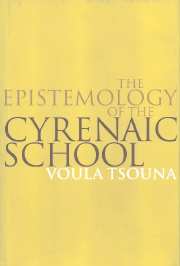Book contents
- Frontmatter
- Contents
- Preface
- Abbreviations
- 1 Knowledge and the good life: the ethical motivation of the Cyrenaic views on knowledge
- PART I SUBJECTIVISM
- PART II SCEPTICISM
- PART III SUBJECTIVISM, EMPIRICISM, RELATIVISM: CYRENAICS, EPICUREANS, PROTAGOREANS
- Appendix: Sources and testimonies
- References
- Index of names
- Index locorum
- Subject index
1 - Knowledge and the good life: the ethical motivation of the Cyrenaic views on knowledge
Published online by Cambridge University Press: 22 September 2009
- Frontmatter
- Contents
- Preface
- Abbreviations
- 1 Knowledge and the good life: the ethical motivation of the Cyrenaic views on knowledge
- PART I SUBJECTIVISM
- PART II SCEPTICISM
- PART III SUBJECTIVISM, EMPIRICISM, RELATIVISM: CYRENAICS, EPICUREANS, PROTAGOREANS
- Appendix: Sources and testimonies
- References
- Index of names
- Index locorum
- Subject index
Summary
What we usually call Cyrenaic ‘epistemology’ is not an epistemology in the sense that other ancient and modern theories are. It is not a systematic theory exploring coherently and in depth the provenance, nature and structure of knowledge, objective or subjective. Nor, when it comes to scepticism, do we find the Cyrenaics coming to grips with the range of epistemological issues that both Academic and Pyrrhonian enquirers raise in order to cast doubt on the possibility of knowledge. The epistemology of the school basically consists of a two-fold epistemological theme – namely that we have knowledge of our pathē but cannot have knowledge of things in the world – and of a number of elaborations upon that theme. Too often in the course of this study we shall see the Cyrenaics in possession of the conceptual tools that would allow them to raise epistemological issues that are recognisably modern, only to realise thereafter that, nonetheless, they do not go much further than their one basic theme. Those who go through the ancient testimonies may experience a sensation not altogether different from bumping their heads repeatedly against a glass door – a feeling that there is an obstacle there, only it is not immediately obvious what it is.
- Type
- Chapter
- Information
- The Epistemology of the Cyrenaic School , pp. 1 - 6Publisher: Cambridge University PressPrint publication year: 1998



